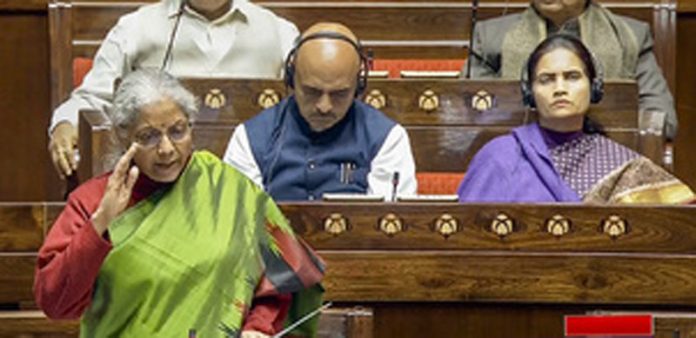NEW DELHI, Dec 20: Parliament on Wednesday passed a bill to raise the age cap of president and members of the GST Appellate Tribunals to 70 years and 67 years, respectively.
Rajya Sabha returned the Central Goods and Services Tax (Second Amendment) Bill, 2023 to Lok Sabha without any changes, thus completing the Parliamentary procedure for the bill. Lok Sabha had cleared the bill on Tuesday.
Replying to a short discussion on the bill in Rajya Sabha, Finance Minister Nirmala Sitharaman said the amendment has been brought as suggested by the Chief Justice of India.
She said the finance ministry was “rightly alerted” and also advised by the Supreme Court of India’s Registrar on the suggestions of the Chief Justice of India that amendments to the legislation will have to be in alignment with regulations for other tribunals.
“Since it was a valid suggestion and pointed out by the Supreme Court, we quickly thought it was important for us to respond and we responded in time. Therefore, we have come up with these two amendments,” Sitharaman said.
The bill, approved by Parliament, seeks to raise the cap on age for president and members of the GST Appellate Tribunals (GSTAT) to 70 years and 67 years, respectively.
Currently, the age limit for the president is 67 years and for members is 65 years.
The bill also aims to align the provisions of the Central GST Act in line with the Tribunal Reforms Act, 2021.
Among others, with the latest changes, an advocate with 10 years of ‘substantial experience’ in litigation in matters relating to indirect taxes in an appellate tribunal, would be eligible to be appointed as a judicial member of the GSTAT.
The minister also replied to queries and suggestions made by Rajya Sabha members during the discussion.
She said that before GST, people used to pay very high prices for daily-use commodities.
But after the introduction of GST, prices of daily items like toothpaste, brush, and hair oil, have come down, the minister said.
Some members had suggested that petroleum products should be brought under the ambit of GST.
In response, the minister said, “I wish the state governments see the point and eventually customers will pay less tax if the GST is brought in, the overlapping, the doubling of tax will not be there”.
The finance minister also sought to assure the House that the central government was responding speedily to the situation arising out of floods in four districts of Tamil Nadu.
“I assure the people of Tamil Nadu that Prime Minister Narendra Modi will be there whenever you need,” she said.
The minister also added that because of the speedy response of the home minister, the state got rescue helicopters, boats, medicines, and other assistance in time.
Participating in the discussion, Amar Patnaik (BJD) supported the bill but drew attention of the government to the number of vacancies in different tribunals and asked to fill them quickly.
Sushil Kumar Modi (BJP) sought to highlight that fraudulent credit claims are becoming a huge challenge as has been witnessed in the European Union and suggested a simplified registration and return process for those traders who intend to buy and sell only within a state.
Masthan Rao Beeda (YSRCP) also supported the bill but called for simplification in the GST slabs saying complexity was creating confusion, increase in administrative burden and potential errors.
BJP member Prakash Javadekar said 95 per cent of the decisions by the GST Council have been taken unanimously in a transparent matter.
BJP’s Arun Singh said the Modi government has brought administrative reforms in the country and has simplified the law and provisions.
M Thambidurai (AIADMK) also supported the bill.
Sikander Kumar, Deepak Prakash, Dhananjay Bhimrao Mahadik, Naresh Bansal, Rakesh Sinha and DP Vats of BJP also participated in the discussion.
Meanwhile, when the Upper House reassembled for the post lunch session, a motion to elect one member to the Court of the University of Delhi was passed by voice vote. (PTI)


